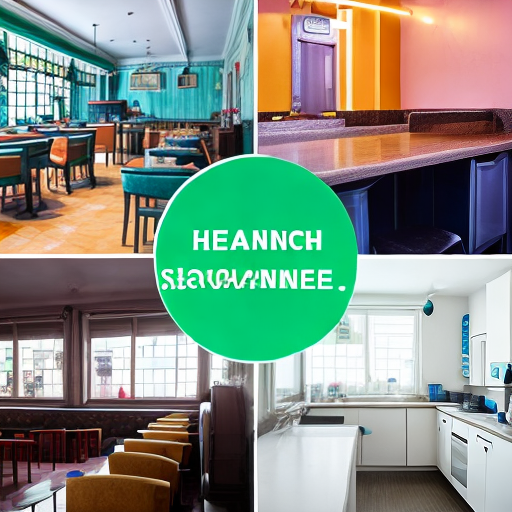– Title: The Zen of Cleaning: How Tidying Up Can Improve Your Mental Well-being

The Zen of Cleaning: How Tidying Up Can Improve Your Mental Well-being
Introduction: The Connection Between Cleaning and Mental Well-being

Cleaning is often seen as a mundane and tedious task, but did you know that it can have a profound impact on your mental well-being? A clean and organized space not only creates a visually pleasing environment but also promotes a sense of calm and tranquility. In this blog post, we will explore the benefits of a clean and organized space, the psychology of decluttering, practical tips for tidying up, and how cleaning can be a mindful practice. So, grab your cleaning supplies and let’s dive into the world of the Zen of Cleaning.
The Benefits of a Clean and Organized Space

A clean and organized space has numerous benefits for your mental well-being. Firstly, it reduces stress and anxiety. Clutter and mess can overwhelm our senses and make it difficult to focus and relax. By tidying up and creating a clean space, you can create a sense of order and control in your surroundings, leading to a calmer state of mind.
Secondly, a clean space promotes productivity. When your environment is clutter-free, you can think more clearly and efficiently. You’ll find it easier to concentrate on tasks and be more productive in your daily activities. A clean space also reduces distractions, allowing you to stay focused on what truly matters.

The Psychology of Decluttering: How It Relieves Stress and Anxiety
Decluttering goes beyond just tidying up physical spaces; it also has a psychological impact. When we declutter, we let go of items that no longer serve us, creating space for new energy and possibilities. This act of letting go can be incredibly liberating and can relieve stress and anxiety.
Research has shown that clutter can increase cortisol levels, the hormone associated with stress. By decluttering and organizing our spaces, we can reduce the levels of cortisol in our bodies, leading to a more relaxed and peaceful state of mind.
Practical Tips for Tidying Up: From Marie Kondo to Minimalism
When it comes to tidying up, there are various approaches you can take. One popular method is the KonMari method, developed by Marie Kondo. This method encourages you to declutter by asking yourself if an item sparks joy in your life. By focusing on joy and letting go of items that no longer bring happiness, you can create a space filled with things that truly matter to you.
Another approach is minimalism, which advocates for owning fewer possessions and living a simpler life. Minimalism encourages you to declutter and only keep items that are essential and meaningful to you. By embracing minimalism, you can create a clean and clutter-free space that promotes a sense of calm and contentment.
Cleaning as a Mindful Practice: Finding Peace in Everyday Chores
Cleaning can be more than just a chore; it can be a mindful practice. Mindfulness involves being fully present in the moment and paying attention to your thoughts, feelings, and sensations. When you approach cleaning with mindfulness, you can turn it into a meditative experience.
Focus on the sensations of cleaning, such as the sound of water running, the feel of a clean surface, or the smell of a freshly cleaned room. By bringing your attention to these details, you can find peace and tranquility in the act of cleaning.
Creating a Cleaning Routine: Maintaining a Calm and Organized Space
To maintain a clean and organized space, it’s important to establish a cleaning routine. By incorporating regular cleaning habits into your daily or weekly schedule, you can prevent clutter from accumulating and ensure that your space remains tidy.
Start by creating a checklist of cleaning tasks and allocate specific times for each task. Breaking down the cleaning process into smaller, manageable steps can make it feel less overwhelming. Remember, consistency is key when it comes to maintaining a calm and organized space.
The Power of Scent: Aromatherapy and Cleaning
Cleaning not only involves visual and tactile sensations but also olfactory experiences. The power of scent should not be underestimated when it comes to creating a clean and inviting space. Aromatherapy, the use of essential oils, can enhance your cleaning experience and promote relaxation.
Choose scents that are known for their calming properties, such as lavender, chamomile, or eucalyptus. Add a few drops of essential oil to your cleaning solutions or use a diffuser to fill your space with a soothing aroma. The combination of a clean environment and pleasant scents can have a positive impact on your mental well-being.
Cleaning as Self-Care: Treating Yourself to a Tidy Environment
Lastly, cleaning can be seen as an act of self-care. Taking care of your physical environment is just as important as taking care of your mental and emotional well-being. By creating a clean and organized space, you are creating a nurturing environment for yourself.
Treat cleaning as an act of self-love and appreciation. Put on your favorite music, light a scented candle, and enjoy the process of transforming your space into a sanctuary. Remember, you deserve to live in a clean and clutter-free environment that supports your well-being.
Conclusion: Embrace the Zen of Cleaning for a Happier, Healthier You
Cleaning may not be the most glamorous task, but it has the power to improve your mental well-being. By embracing the Zen of Cleaning, you can create a clean and organized space that promotes calmness, reduces stress, and enhances productivity. Whether you follow the KonMari method, embrace minimalism, or simply approach cleaning with mindfulness, remember that cleaning is not just a chore; it is an opportunity to create a happier and healthier environment for yourself. So, grab your cleaning supplies and start your journey towards a tidier and more peaceful life.

